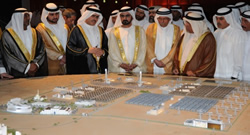To Make Fresh Water without Warming the Planet, Countries Eye Solar Power
 Richard Martin for MIT Technology Review: At the giant Mohammed bin Rashid Al Maktoum Solar Park under construction near Dubai, a desalination facility goes into operation this month. Run by an array of solar panels and batteries, the system will produce about 13,200 gallons of drinking water a day for use on site. That’s insignificant compared with desalination plants elsewhere, but it’s a start toward answering a pressing question: can countries stop burning fossil fuels to supply fresh water?
Richard Martin for MIT Technology Review: At the giant Mohammed bin Rashid Al Maktoum Solar Park under construction near Dubai, a desalination facility goes into operation this month. Run by an array of solar panels and batteries, the system will produce about 13,200 gallons of drinking water a day for use on site. That’s insignificant compared with desalination plants elsewhere, but it’s a start toward answering a pressing question: can countries stop burning fossil fuels to supply fresh water?
Hundreds of desalination plants are planned or under way worldwide because fresh water is increasingly precious. According to a report from the International Food Policy Research Institute, more than half the world’s population will be at risk of water shortages by 2050 if current trends continue.
In drought-ridden California, a $1 billion plant at Carlsbad, north of San Diego, will produce 54 million gallons of fresh water a day. The giant Sorek plant in Israel can crank out more than 160 million gallons a day (see “Megascale Desalination” and “Desalination Out of Desperation”). But these plants are a devil’s bargain; they use power from plants that, in most cases, emit greenhouse gases, ultimately worsening the problem of drought. Saudi Arabia, for instance, uses around 300,000 barrels of oil every day to desalinate seawater, providing some 60 percent of its fresh water supply. That’s not sustainable. Finding a way to produce fresh water without burning fossil fuels is critical not just for the desert countries of the Middle East but for a growing number of places around the world. Cont'd...
Comments (0)
This post does not have any comments. Be the first to leave a comment below.
Featured Product

